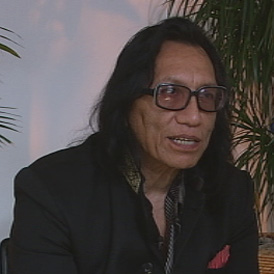Rodriguez: a singer whose career came back from the dead
Dead famous: the extraordinary career of US folk-singer Rodriguez who gave up recording, never imagining his music was a massive hit in far away South Africa where they thought he was dead.
In apartheid South Africa the “fight-the-establishment” songs of folk singer Rodriguez were big. Bigger than Elvis or the Beatles.
While bootleg copies of his album Cold Fact were not banned, it did not get any radio play except on pirate radio. Yet despite that it was a word-of-mouth phenomenon.
In the words of one reviewer Cold Fact was “an astonishingly simple folk album from a hitherto unknown singer crept into the hearts of many, occupying a unique place unparalleled elsewhere in the vast world of music”.
Back home in the US, his two albums had sold so badly that Cold Fact had been deleted by his label. And Rodriguez himself was a mystery.
In the absence of any official publicity, rumours circulated about what had become of the musician from Detroit: some said he had died of an overdose, others that he was in a mental institution or had committed suicide on stage. It all added to his mystique, and helped build his fan base.
In 1996 two of his most ardent South African admirers, record store owner Steve Segerman and music journalist Craig Bartholemew, set out to find out the truth. Bartholomew later recalled his nine-month quest as “72 phone calls, 45 faxes, 142 emails, long nights reading through encyclopedias, music books, dead ends, loose ends and fag ends”.
But to his astonishment it turned out that after 24 years of silence, Sixto Rodriguez was alive and still living in a poor neighbourhood of Detroit.
In fact, after his failure to make it big in his homeland, his career had taken various twists and turns: in the late 1970s he toured Australia as support act to the Mark Gillespie Band, he studied philosophy, he organised American Indian pow-wows and more than once ran to be mayor of Detroit.
But by the time Bartholomew caught up with him, far from running the city, he was working on building sites as a self-employed labourer. And of his success in South Africa he knew nothing.
Now his extraordinary story has become an award-winning documentary.
Channel 4 News reporter Katie Razzall on meeting Rodriguez:
The film about Rodriguez opened this week's Sheffield Documentary Festival - and he did a gig afterwards. The mood in the room was joyful. Who couldn't love his story? The music industry is full of tales of disappointment, but here is a real fairytale ending. People clapped, cheered and filmed on their phones, all aware we were sharing a remarkable moment in the singer-songwriter's life. And today I met up with this man who effectively came back from the dead. I was amazed by his humility. Was he angry at the people who kept what was rightfully his while he did years of back-breaking manual labour to make ends meet? Answer, no.Rodriguez is simply excited to be back touring and making music just shy of his 70th birthday. It's a lesson for us all.
At this year’s Sundance film festival “Searching for Sugar Man” won the World Cinema Audience Award and a special jury prize.
Its name refers to Cold Fact’s opening track “Sugar Man”, which has become his signature tune and has since been re-released on compilation albums, sampled by rappers and used as the soundtrack to a film.

As for Rodriguez, his rediscovery may have brought him face-to-face with his devoted South African fans on a series of sell-out tours, platinum-selling album success and adulation the world over. But this humble man told Channel 4 News that both he and his family remain bewildered by this reversal of fortune.
When “Searching for Sugar Man” opened the Sheffield documentary festival this week, Rodriguez was on hand for a live gig in front of a room full of enthusiastic fans, many of whom had only just heard of him.
So why does he think his music is still so relevant?
Rodriguez remembers back to the rallies of the 70s where the songs were first sung: “All the protest signs were about jobs and war.”
“Searching for Sugar Man” is showing at the British Film Institute on 16 June and goes on general release in the UK on 27 July.